Fortescue baronets, of Salden (1636)

- Sir John Fortescue, 1st Baronet (1592–1656)
- Sir John Fortescue, 2nd Baronet (1614–1683)
- Sir John Fortescue, 3rd Baronet (1644–1717)
- Sir Francis Fortescue, 4th Baronet (c. 1662–1729)
There have been three baronetcies created for persons with the surname Fortescue, one in the Baronetage of Nova Scotia and two in the Baronetage of England. Two of the creations are extinct while the other is dormant.
The Fortescue Baronetcy, of Salden in the County of Buckingham, was created in the Baronetage of Nova Scotia on 17 February 1636 for John Fortescue. The title became dormant on the death of the fourth Baronet in 1729.
The Fortescue Baronetcy, of Fallapit (alias Fallopit/Vallopit) in the County of Devon, in the parish of East Allington, was created in the Baronetage of England on 31 March 1664 for Edmund Fortescue, subsequently Member of Parliament for Plympton Erle. The title became extinct on the death of his son the second Baronet in 1683.
The Fortescue Baronetcy, of Woodleigh in the County of Devon, was created in the Baronetage of England on 29 January 1667 for Peter Fortescue (1620-1685) of Wood in the parish of Woodleigh, 3rd son of Francis Fortescue (d.circa 1649) of Preston, Devon, descended from John Fortescue (d.1479) of Wympstone in the parish of Modbury, Devon, MP for Totnes, Tavistock and Plympton. [1] The title became extinct on his death in 1685.


Nineteen baronetcies have been created for persons with the surname Hamilton, eight in the Baronetage of Nova Scotia, one in the Baronetage of England, five in the Baronetage of Ireland, one in the Baronetage of Great Britain and four in the Baronetage of the United Kingdom. As of 2008 two creations are extant, two are dormant, two are either extinct or dormant and twelve extinct.

East Allington is a village and civil parish in the South Hams district of Devon, England, three miles (5 km) south of Halwell and just off the A381 road. It lies about three miles (5 km) from Kingsbridge and about ten miles (16 km) from Totnes. The coast at Slapton Sands is about five miles (8 km) to the south-east. Also in the parish is the hamlet of The Mounts, about one mile (1.6 km) away.

There have been four baronetcies created for persons with the surname Hope, three in the Baronetage of Nova Scotia and one in the Baronetage of the United Kingdom. As of 2010 one creation is extant, one dormant and two extinct.
There have been two baronetcies created for persons with the surname Bethune, one in the Baronetage of Nova Scotia and one in the Baronetage of the United Kingdom.

There have been four baronetcies created for people with the surname Drake, three in the Baronetage of England and one in the Baronetage of Great Britain.
There have been three baronetcies created for persons with the surname Foulis, one in the Baronetage of England and two in the Baronetage of Nova Scotia.

There have been five baronetcies created for persons with the surname Kennedy, one in the Baronetage of Ireland, three in the Baronetage of Nova Scotia and one in the Baronetage of the United Kingdom. One creation is extant as of 2010.
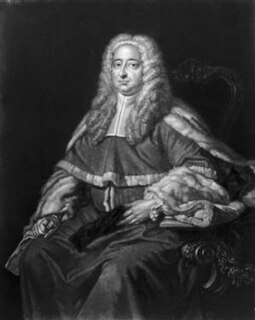
Sir William Fortescue of Buckland Filleigh, Devon, was a British judge and Master of the Rolls 1741–1749.

The Rayney Baronetcy, of Wrotham in the County of Kent, was a title in both the Baronetage of Nova Scotia and the Baronetage of England. It was first created in the Baronetage of Nova Scotia on 19 December 1635 for Sir John Rayney of Wrotham Place, Wrotham, Kent. He was then created a Baronet in the Baronetage of England on 22 January 1642, with the same territorial designation. Rayney's father John Rayney, of West Malling, was a merchant and Alderman of London who bought Wrotham Place which became the family seat. The first Baronet had been knighted at the Coronation of Charles I in 1626. He served as High Sheriff of Kent in 1646. On the death of the fifth Baronet in 1721 the English baronetcy became extinct while the Scottish baronetcy became dormant.

The Fowell Baronetcy, of Fowellscombe in the County of Devon, was a title in the Baronetage of England. It was created on 30 April 1661 for Edmund Fowell of Fowelscombe in the parish of Ugborough, Devon, previously Member of Parliament for Ashburton. The second Baronet also represented Ashburton in Parliament. The third Baronet was Member of Parliament for Totnes. The title became extinct on his death in 1692.
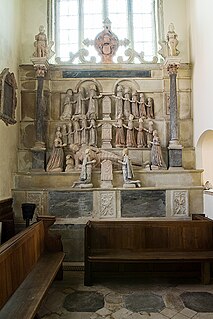
Sir Thomas Hele, 1st Baronet, c. 1595 to 7 November 1670, was a landowner from Devon and MP on various occasions from 1626 to 1670. A Royalist during the 1642 to 1646 First English Civil War, he raised a regiment of cavalry which served in the West Country and sat in the Oxford Parliament.
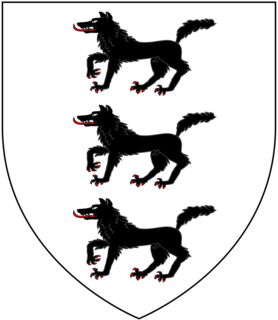
The Lovett Baronetcy, of Liscombe House in the County of Buckingham, was a title in the Baronetage of Great Britain. It was created on 23 October 1781 for Jonathan Lovett of Liscombe in the parish of Soulbury, Buckinghamshire. He was subsequently offered a peerage but declined, on the grounds that his only son had died. Lovett married Sarah Darby, but died in 1812 without surviving male issue, his son Robert Turville Jonathan Lovett having pre-deceseased him in 1807, and thus the title became extinct.
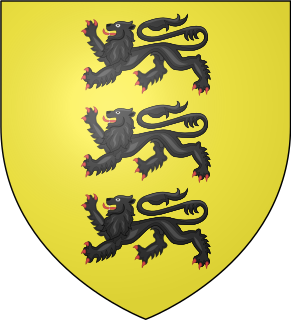
Sir John Carew, 3rd Baronet of Antony, Cornwall, was an English politician who sat in the House of Commons variously between 1660 and 1692.

Sir Edmund Fowell, 1st Baronet of Fowelscombe in the parish of Ugborough in Devon, was a Member of Parliament for Ashburton in Devon from 1640 to 1648.
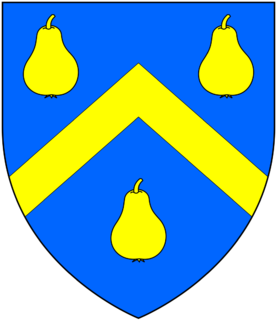
Josias II Calmady of Langdon, in the parish of Wembury, Devon, was Member of Parliament for Okehampton in the Convention Parliament of 1660.
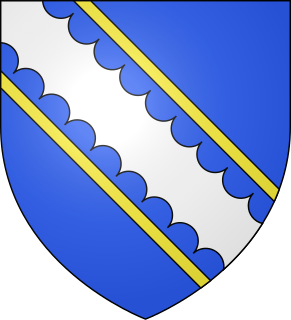
Sir Henry Fortescue, was Lord Chief Justice of Ireland.

Sir Arthur Harris, 1st Baronet of Hayne in the parish of Stowford in Devon, was four-times elected as a Member of Parliament for Okehampton in Devon, between 1671 and 1685.

Woodleigh is a village, parish and former manor located in the South Hams region of the county of Devon, England.
Sir Edmund Fortescue, 1st Baronet was an English politician, MP for Plympton Erle.

Spridleston is an historic manor in the parish of Brixton in Devon, England, long a seat of a branch of the prominent and widespread Fortescue family. The ancient manor house does not survive, but it is believed to have occupied the site of the present Spriddlestone Barton, a small Georgian stuccoed house a few hundred yards from the larger Spriddlestone House, also a Georgian stuccoed house, both centred on the hamlet of Spriddlestone and near Higher Spriddlestone Farm.